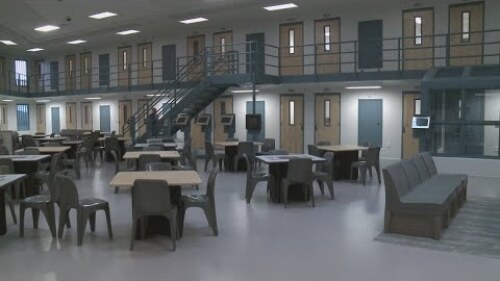By Aubrey Whelan and Samantha Melamed
The Philadelphia Inquirer
PHILADELPHIA — A federal judge said Thursday he would rule that Philadelphia’s prison system is in contempt of court for failing to follow an agreement in a long-running lawsuit over conditions in the city jails.
U.S. District Court Judge Gerald A. McHugh acknowledged that the city had taken steps to mitigate a staffing crisis in the jails causing prolonged lockdowns, mounting chaos on housing units, and delays in access to services including medical care. But he said those efforts were insufficient.
McHugh said he would file an order declaring the city in contempt later, and then decide what sanctions to impose on the city at a later date.
The city had committed to address those issues in an April 2022 settlement of a class-action lawsuit filed on behalf of the roughly 4,500 people incarcerated, awaiting trial or serving short sentences, in the jail complex on State Road in Northeast Philadelphia. Twice since the lawsuit was filed, at the start of the pandemic in 2020, the city agreed to pay $125,000 to Philadelphia’s nonprofit bail funds to avoid contempt findings.
But now, on two core issues — staffing levels, and the amount of time people incarcerated there can spend outside of their cells — McHugh said that it was “virtually undisputed that we don’t have compliance” with the terms of the agreement.
A monitor appointed by McHugh reported in March that the city had taken “a course of half measures steeped in bureaucratic and political rigidity with devastating consequences” for both prisoners and staff.
Michael Resnick, the city’s prison commissioner, declined to comment Thursday at a court hearing where McHugh announced his intention.
McHugh said the city was operating in good faith in its efforts, outlined by city lawyers in court, to fix understaffing issues by recruiting more officers, with better pay and more incentives to join the prisons staff. But, he said, the city must do more to address the problem.
Correctional officer staffing is currently slightly more than half of the number needed to safely run the jails. That’s an even higher vacancy rate than when the case was settled, amid a national corrections staffing shortage.
The decision should compel the city to quickly to fix issues in the jails, said Su Ming Yeh, executive director of the Pennsylvania Institutional Law Project and one of a team of lawyers representing Philadelphia prisoners in the class-action suit.
“During this time, people have been suffering,” she said. “There have been many deaths, people not getting medical care, and a lot of violence.”
An effort to recruit more corrections officers
In an affidavit filed this week, Resnick said the jails had increased salaries and hired the former correctional officers union president to focus on recruiting efforts. He said he has also been regularly meeting with District Attorney Larry Krasner, the Defender Association of Philadelphia, and a judge overseeing jail reform plans to reduce the population of incarcerated people in the city.
Resnick also outlined plans to curb inefficiencies around transporting prisoners to off-site medical appointments — including outsourcing some of that work to a contractor.
The city is also partnering with Jefferson Health to open a secure ward for up to nine incarcerated patients at Jefferson Frankford Hospital, to reduce the number of corrections officers needed to accompany prisoners receiving hospital care.
A recent study analyzed data on the number of COs and the number of prisoners in each state. Watch the video below to see which states have the most understaffed prisons.
Many of the efforts make sense to David Rudovsky, a civil rights lawyer who is also representing Philadelphia prisoners in the lawsuit. But, he said, they’re “too little, too late.”
For example, he said, the city has a shortage of 800 corrections officers, but the plan to open a secure ward at Frankford Hospital would free up only 26 officers.
“It should have been done three years ago,” Rudovsky said.
Delays in medical care at the city’s jails
People incarcerated in the city jails have missed medical appointments because no correctional officers are available to drive them from the facilities, Rudovsky said.
And short-staffing has interfered with the jails’ ability to administer medications for opioid use disorders.
A recent Inquirer investigation found that 29 people have died in Philadelphia police or jail custody since 2018 from accidental overdoses, from complications of withdrawal, or from suicides completed while withdrawing from illicit drugs.
Staffing issues have left patients waiting up to 15 days before entering the jail’s medication-assisted addiction treatment program, the jails’ medical director, Bruce Herdman, said in an interview last week.
Staffing shortages have also enabled a brisk market in contraband to flourish, internal reports show. In May and June, at least eight incarcerated people received medical care for overdoses, seizures or other adverse reactions to drugs obtained inside the jails, the reports showed. And just this Tuesday, two more prisoners were rushed to the hospital after being revived with Narcan from apparent overdoses, according to an incident report obtained by The Inquirer.
It is unclear what sanctions McHugh would impose on the city. “Great care and deliberation needs to go into forming the remedy,” he said.
Rudovsky had requested that the city be made to pay $5 a day to each person incarcerated in Philadelphia as long as the city was in contempt of court — about $8.3 million per year.
A lawyer for the city, Anne Taylor, said that remedy was both inequitable, since it would go to only those currently incarcerated, and impracticable, given the challenge of calculating and disbursing the fees due to each individual class member.
Rudovsky said a substantial fine is necessary — to “call everyone’s attention to it in city government.”
©2024 The Philadelphia Inquirer.
Visit inquirer.com.
Distributed by Tribune Content Agency, LLC.















